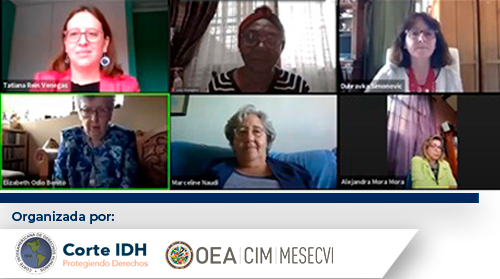
San José, Costa Rica, May 29, 2020

Today, the High-Level Meeting Violence against women and girls and the COVID-19 Pandemic was held, organized by the Inter-American Court of Human Rights (I/A Court H.R.), the Inter-American Commission of Women (CIM/OEA) and the Follow-up Mechanism to the Belém do Pará Convention (MESECVI), with the participation of more than 2,300 people connected through the various platforms.
Participating in the panel were Alejandra Mora Mora, Executive Secretary of the CIM/OAS, Dubravka Simonovic, United Nations Special Rapporteur for Violence against Women, its causes and consequences, Tatiana Rein Venegas, President of the Committee of Experts of MESECVI, Lucy Asuagbor, Special Rapporteur on the Rights of Women of the African Commission on Human Rights, and Marceline Naudi, President of the Group of Experts on Action Against Violence against Women and Domestic Violence of the Council of Europe.
“We know that since this pandemic began and even before, great concern had been raised about the impact that this situation could have on the lives of women. In previous pandemics, the situation of women has been particularly dramatic, specifically because of the difference this has on the impact on their lives,” said Judge Elizabeth Odio Benito.
“On this occasion we have had a combination of efforts that have put us in the front line as women which is where we now find ourselves. The work that both national and international organizations have done to analyze the seriousness of domestic and sexual violence against women during the pandemic is remarkable,” said the President of the Inter-American Court of Human Rights.
The Executive Secretary of the CIM/OAS, Alejandra Mora Mora, pointed out that “the COVID-19 pandemic has deepened gender inequalities. Despite the fact that many of the functions of the public world have been transferred to the private sphere, the gender division of labor continues to operate to the detriment of women, producing a care crisis and a resurgence of violence against women. Staying at home is different for women, which is why it is necessary that the issue of care and comprehensive measures to protect women victims of violence be the central focus of the policies that are being taken in managing the pandemic," Mora highlighted.
“It is important to join efforts from the United Nations System and regional mechanisms such as the European, African and Inter-American System in the fight against violence against girls and women. We are in the midst of this crisis and it is necessary to remind States of their obligations to respect the rights of women during the pandemic,” said Simonovic, United Nations Special Rapporteur.
“Indeed, given the confinement experienced by women and the entire population to prevent the spread of infection, there has been an increase in situations of physical, psychological, and economic violence and the most seriously, femicides. There has been an increase in the femicide rate of up to 25% in the countries of the region. We are seeing an increase in violence against women, but often they are not able to file complaints,” said the President of the Committee of Experts, Tatiana Rein, when presenting a series of recommendations generated by the MESECVI.
“When you look at the measures taken by most governments in Africa, they do not include a dimension to address the situation against women in this pandemic. When you look at the statistics, nothing is mentioned about how women are suffering from this particular pandemic,” said the Special Rapporteur on Women's Rights of the African Commission on Human Rights.
Presenting a snapshot of the European situation, Marceline Naudi pointed out that “Millions and millions of women in the world are experiencing this situation. The Council of Europe has requested information from the States regarding handling of the situation of violence against women during the pandemic. Most of the States indicated that they had taken special measures to prevent violence against women within the pandemic”, affirmed the President of the Group of Experts on Action against Violence against Women and Domestic Violence.
At the end of the activity, Judge Odio made a call to continue with the work between the different national and international levels to fight against impunity. “These enormous problems for girls and women have never been given the necessary political attention. The Inter-American Court of Human Rights has been concerned about the different aspects of the pandemic’s impact on Human Rights, and for this reason it issued the COVID-19 and Human Rights Declaration at the beginning of April. Priority must be given to dealing with this challenge based on human rights, with the different international cooperation mechanisms working together in an integrated manner,” said Judge Odio Benito.
(46 restantes)